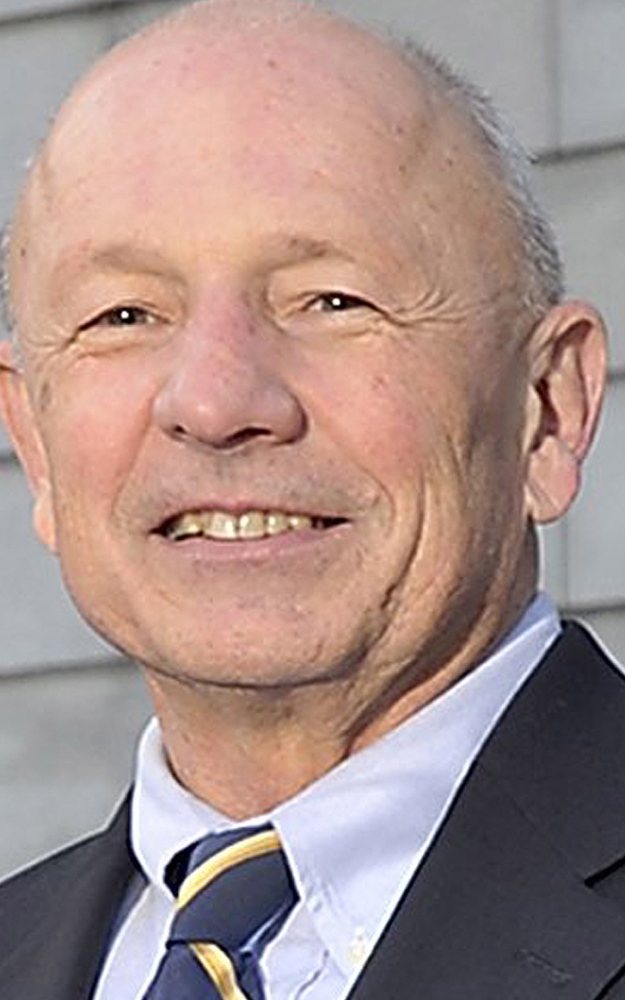Mayor Michael Brennan formally announced his re-election bid Wednesday, saying he wants to continue working on education, food and economic initiatives over the next four years.
Meanwhile, the man who finished second to Brennan in 2011 by 1,900 votes, Democrat Ethan Strimling, said Wednesday afternoon he has no plans to run, but continues to listen to his supporters and Brennan’s re-election message.
Flanked by a dozen supporters at a news conference at the Ocean Gateway Terminal, Brennan called for Portland to continue to be a welcoming and compassionate city. He noted that his grandmother came to Portland from Ireland in 1909. She was 14 years old and had a sixth-grade education. Although she was widowed at the age of 28, she was still able to put her four kids through college by working in the Maine Medical Center kitchen and cleaning houses of the wealthy, he said.
“We have people not only in the city, but we have people from all over the state, all over the country and all over the world that are coming to the city of Portland seeking the same opportunity that my grandmother did,” Brennan said. “As mayor, I’m committed to working with everybody in the city of Portland to make sure that opportunity and those dreams become true.”
Brennan highlighted his work with the Mayors’ Coalition, made up of mayors from Maine’s 12 largest communities, trying to preserve state funding for education, revenue sharing and General Assistance for asylum seekers and visa holders.
Brennan was elected in 2011 as the city’s first popularly elected mayor in nearly 90 years. He bested a field of 15 candidates in an instant runoff election. He’s the first well-known candidate to enter this year’s race.
Coincidentally, Strimling, a former state legislator who is the executive director of LearningWorks, hosted Gov. Paul LePage on Wednesday to announce that the Portland nonprofit was receiving a $350,000 grant from the Department of Corrections and the Department of Labor to support its work with at-risk youth.
When asked about the apparent lack of interest in this year’s mayor’s race, Strimling said it is still early for some candidates.
Bob Baldacci, who worked on Strimling’s 2011 campaign, commissioned and released a poll in April claiming that Strimling could beat Brennan.
“I think people are looking at Mike (Brennan) and giving him a chance to say, ‘OK, let’s see what you’ve done and what you will do with a second term,'” Strimling said.
Brennan said he wants to continue work on his education initiative, Portland ConnectEd. He said 16 public school graduates spent two weeks at Southern Maine Community College last summer in a “step-up program” to prepare them for college. He said each student was paid $200 and received a $500 scholarship an academic coach for a year. As of March, there was a 75 percent retention rate and the students had a collective GPA of 2.5, he said.
Brennan said a similar program will be launched this summer at the University of Southern Maine.
Brennan also highlighted his Growing Portland initiative, a workforce development program that has 21 community partners in higher education, the private sector and research and development fields.
“We now believe that we are in a position to create the first health informatics cluster in the state of Maine and one of the first in the country and that’s going to create good-paying, high-quality jobs for the city,” he said of the sector that manages data to health care professionals.
Brennan also said the city continues to work on creating a “positive regulatory environment” for businesses by streamlining the permit process.
He downplayed the regulatory impact of other initiatives that some say burden local businesses. He called fees on storm water and plastic bags and a ban on polystyrene foam environmental issues and said his proposal to increase the minimum wage in Portland will help economic equality.
Brennan also highlighted his support for an inclusionary zoning ordinance – a proposal that would require a certain percentage of units in large residential developments to be affordable to middle-income families.
Ultimately, Brennan said his policies seek to ensure that “no one is left behind.”
“We want to make sure that everyone in the city has the opportunity to prosper and to thrive,” Brennan said. “That means a wage that allows people to live in the city. That means affordable housing. And that means access to health care.”
Copy the Story LinkSend questions/comments to the editors.




Success. Please wait for the page to reload. If the page does not reload within 5 seconds, please refresh the page.
Enter your email and password to access comments.
Hi, to comment on stories you must . This profile is in addition to your subscription and website login.
Already have a commenting profile? .
Invalid username/password.
Please check your email to confirm and complete your registration.
Only subscribers are eligible to post comments. Please subscribe or login first for digital access. Here’s why.
Use the form below to reset your password. When you've submitted your account email, we will send an email with a reset code.